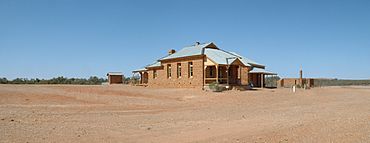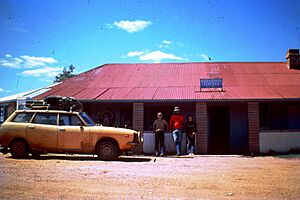Milparinka, New South Wales facts for kids
Quick facts for kids MilparinkaNew South Wales |
|||||||||
|---|---|---|---|---|---|---|---|---|---|

Historic buildings at Milparinka
|
|||||||||
| Population | 77 (2016 census) | ||||||||
| Established | 1880 | ||||||||
| Location |
|
||||||||
| LGA(s) | Unincorporated Far West Region | ||||||||
| County | Evelyn | ||||||||
| State electorate(s) | Barwon | ||||||||
| Federal Division(s) | Parkes | ||||||||
|
|||||||||
Milparinka is a small settlement in north-west New South Wales, Australia, about 250 kilometres (155 mi) north of Broken Hill on the Silver City Highway. At the time of the 2016 census, Milparinka had a population of 77 people. Milparinka is on Evelyn Creek.
Summer temperatures can reach 48 °C (118 °F).
History
Indigenous Australians were the original residents of the region. They lived in small villages of large huts made by bending saplings and securing them to the ground. Branches, grass and clay were then placed to construct the walls and roof. Around March of each year, they would harvest and thresh various local native grasses to obtain seeds to make a type of flour for subsistence. Large heaps of harvested grass were collected like haystacks.
In 1844, Charles Sturt's expedition was stranded for six months at nearby Preservation Creek, owing to a lack of supplies.
In 1880, a local Indigenous woman showed prospector James Evans gold nuggets lying on the surface of Mt Browne. Evans subsequently obtained 24 ounces of gold and a rush to the region commenced soon after. The mostly-male population of the Mt Browne goldfield at peaked at 3,000, with W.H.J. Slee being appointed the resident Goldfields Warden in January 1881. Cobb & Co coaches ran three times a week from Milparinka to Wilcannia on the Darling River (the closest settlement, as Broken Hill did not yet exist) and by August 1881 the official gold escort had carried about 10,000 ounces of gold from the field, not to mention that which went privately.
In this arid region, water was so scarce that miners collected their gold by dry blowing. Water was selling for one shilling per bucket and dysentery was rife, until in September 1881, on the recommendation of W.H.J. Slee, the New South Wales government authorised the drilling of a well. In December 1881, the government well struck water at 140 feet, which caused great relief to all.
At its height, Milparinka had a newspaper, a police office, a chemist shop, two butchers, a courthouse (1886), a school (1883), a hospital (1889) and four hotels. There was drought in 1884.
In June 1902, a large meteorite landed at nearby Mt Browne.
Heritage listings
The ruins of the Albert Goldfield are listed on the New South Wales State Heritage Register.




